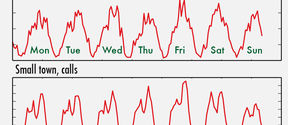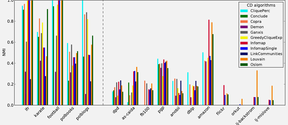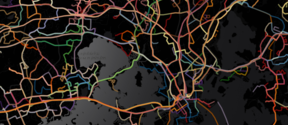Circadian rhythms
e are currently working on both massive databases of auto-recorded digital data as well as personal sensors (wristbands, bed sensors) to study circadian patterns.
Complex Systems is a transdisciplinary research area that builds on statistical physics, computer science, data science, and applied mathematics. Complex systems consist of large numbers of interacting elements, with stochastic interactions and non-trivial interaction structure. They are often outcomes of evolutionary processes, and display rich structures and dynamical phenomena from self-organization to phase transitions.
Complex systems are found at all scales in Nature, from the complex machinery operating inside our cells to the human brain and to various aspects of human sociality and the networked social organization of humans. Intriguingly, these systems are often shaped by forces of similar nature, and therefore understanding one system may provide surprising insights into entirely different domains.
Our faculty has a strong focus on complex networks and network science, with applications in (among others) computational social science, network neuroscience, biomedical sciences and health technology, as well as humanities.
Contact jari.saramaki@aalto.fi

e are currently working on both massive databases of auto-recorded digital data as well as personal sensors (wristbands, bed sensors) to study circadian patterns.

Most networks are not homogenious, meaning that some sets of nodes are more connected among themselves than to the rest of the network. The aim of community detection is to study this mezo-scale structure and devise algorithms that would identify these sets of nodes.

In our research project we aim to collect public transport timetable data around the world, curate the data, and publish it in a variety of formats available to be used for both transit planners as well as network scientists.
Much of the work done in the Complex Systems Group that involves empirical networks modeling or method development also involves computational problems that cannot be solved with existing software. We often develop novel algorithms and techniques to push the boundaries of analysis of complex systems. In this page the results of that work is shared in hope that these tools will benefit the research community and other people interested in complex networks.
See our GitHub page for software we have published.
EDENetworks is an easy to use tool for analysing genetic networks. It allows researchers to use the tools from complex networks science to analyse genetic data using a user friendly graphical interface. You can study both individual level or population level networks by giving either a genetic marker file or a distance matrix as an input. EDENetworks was developed as a part of the EDEN project.
See the EDENetworks homepage: http://www.becs.tkk.fi/edenetworks/
License: GPL2
The LCElib is a c++ library consisting of weighted network data structures and analysis methods. It also contains some efficient implementations of various network models. The library was developed in order to handle large data sets and work as an efficient backbone for developing new network models. It is in active use in our research group.
The source code can be found from here: lcelib_1.0.tar.gz
Publication regarding the data structures:
Efficient data structures for sparse network representation, J. Hyvönen, J. Saramäki, and K. Kaski, Int. J. Comp. Math., Vol. 85, Issue 8, pp. 1219-1233 (2008)
License: GPL2
The sequential clique percolation algorithm is method for detecting clique percolation communities. It is an alternative to CFinder: instead of finding maximal cliques in a graph and producing communities of all the possible clique sizes the SCP algorithm finds all the cliques of single size and produces the community structure for all the possible thresholds. The SCP algorithm should work well even for large sparse networks, but might have trouble for dense networks and cliques of large size.
Publication: A sequential algorithm for fast clique percolation, J.M. Kumpula, M. Kivelä, K. Kaski,and J. Saramäki, Phys. Rev. E 79, 026109 (2008), arXiv:0805.1449
C++ implementation (recommended for large or dense networks): scp_0.1.tar.gz
Python implementation: http://www.lce.hut.fi/~mtkivela/kclique.html